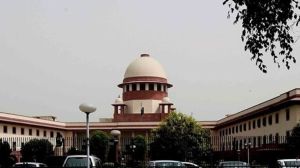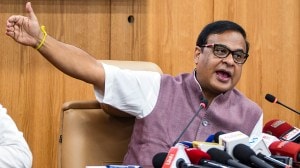IIT-Kanpur director Abhay Karandikar appointed as secretary of department of science and technology
Prof Abhay Karandikar is also working as a consultant for design and implementation of BharatNet, the government’s project to create broadband connectivity to rural India.
 Abhay Karandikar has been appointed to the post till the date of his attaining the age of 60 years, or until further notice. (Source: DST)
Abhay Karandikar has been appointed to the post till the date of his attaining the age of 60 years, or until further notice. (Source: DST) Professor Abhay Karandikar, the director of the Indian Institute of Technology, Kanpur, has been appointed as the secretary of department of science and technology (DST), taking over from Dr Rajesh Gokhale, who held the additional charge along with his post of secretary department of biotechnology.
The previous secretary of DST S Chandrashekhar returned to his parent institute before the end of his tenure on personal grounds.
The Appointments Committee of the Cabinet has approved the appointment of Prof. @karandi65, Director, @IITKanpur to the post of Secretary, @IndiaDST. @PMOIndia @DrJitendraSingh @PrinSciAdvGoI @rajesh_gokhale @guptaakhilesh63 @DrNKalaiselvi pic.twitter.com/j2XpvsQJdT
— DSTIndia (@IndiaDST) September 17, 2023
“The Appointments Committee of the Cabinet has approved appointment of Prof Abhay Karandikar, Director, Indian Institute of Technology, Kanpur to the post of Secretary, Department of Science and Technology (DST) from the date of assumption of charge of the post till the date of his attaining the age of 60 years or until further orders, whichever is earlier,” the official notice stated.
Karandikar was appointed as director of his Alma Mater IIT Kanpur in 2018. He is an electrical engineer who is known for his contributions to the telecommunications sector of the country. His research interests include frugal 5G and rural broadband. He was one of the founding members and also served as chairman of the country’s telecom standards body calle Telecom Standards Development Society of India (TSDSI).
He is also working as a consultant for design and implementation of BharatNet, the government’s project to create broadband connectivity to rural India. With better connectivity in the country, the government is also able to provide services such as tele-consultations from expert doctors at remote locations.
He has also worked with the high-performance computing group of the Center for Development of Advanced Computing (C-DAC), which is implementing the country’s National Supercomputing Mission that envisages a grid of over 70 super-computers across India’s academic institutions. He has more than 20 patents to his credit.





- 01
- 02
- 03
- 04
- 05


























